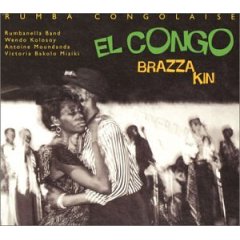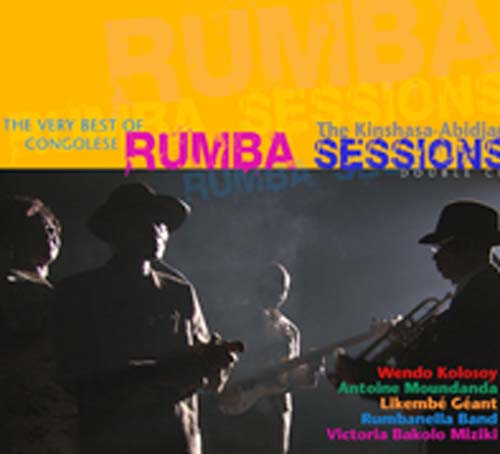Fiche Groupe
Musique

Rumbanella Band
République démocratique du Congo

Genre : Groupe de musique
Français
Rumbanella Band s’est constitué en 1986 sous la direction de Madou Lebon Mulowayi, un guitariste et chanteur qui commença en tant qu’accompagnateur du regretté Jean Bosco Mwenda, l’un des pères fondateurs de la musique congolaise. Madou fut élevé au son de Ngoma, le premier label de musique de Kinshasa ; ce label produisait notamment la musique des chanteurs tels que Losta Bello, Bukasa Leon ou Wendo Kolosoy.
Après dix ans passés à travailler avec Jean Bosco Mwemba, Madou finit par créer sa propre formation afin de faire perdurer le son de la Rumba. Trois autres membres du Rumbanella Band participent à ce projet : le chanteur Lola Bivuatu, le bassiste Bolita Mzela Zimbika, et le guitariste Kankonde Joseph aussi connu sous le nom de » Serpent « , surnom qui lui fut attribué du fait de ses performances de footballeur.
Lorsqu’il commença à jouer de la guitare aux côtés du légendaire Docteur Nico, on trouva que ce qualificatif décrivait aussi bien sa manière de jouer au football que la dextérité avec laquelle il déplaçait ses doigts le long du manche de sa guitare. Tout comme Docteur Nico, et bien d’autres musiciens congolais, Madou et Serpent grandirent et apprirent la musique dans la région minière du Kasaï, au Sud-est du pays. Ils arrivèrent à Kinshasa alors que la ville était le centre culturel et cosmopolite de la région toute entière. Ils eurent la chance de pouvoir entendre cette nouvelle musique qui s’échappait de tous les bars et studios d’enregistrement de la ville.
Ils devinrent vite partie intégrante de la scène Rumba de Kinshasa.
Après s’être séparé de Nico pour des questions d’argent, Serpent joua avec un certain nombre de groupes importants, avant de s’associer à Madou pour créer Rumbanella Band. Leur répertoire est principalement constitué de morceaux classiques des légendaires African Jazz et African Fiesta, revisités et réinterprétés. On trouve aussi une nouvelle version du morceau de Jean Bosco Mwenda, Masanga Djiya, ainsi qu’une composition originale de Serpent, Na Luki Motungisi.
Les choristes du Victoria Bakolo Miziki (Willy et Mass), le saxophoniste Joseph Maproko (ancien soliste de l’African Fiesta) et le jeune percussionniste congolais Emile Biayenda (leader des Tambours de Brazza) se sont joints au Rumbanella Band pour interpréter les rumbas classiques de Tabu Ley Rochereau ou Dr Nico.
Wendo Kolosoy, le père fondateur de la Rumba et son groupe composé de jeunes et de vétérans, le Victoria Bakolo Miziki ont contribué à la réussite de cette session après avoir enregistré l’album Amba (Marabi 46801-2). Ils interprêtent une composition récente du « patriarche » Botiakitembe.
Wendo, accompagné ici par Rumbanella Band, chante une nouvelle version de sa chanson fétiche, Marie-Louise, dont la version originale date de 1948. Mais comment parler de rumba congolaise si l’on ne mentionne pas le roi du likembe (piano à pouces), Antoine Moundanda, le contemporain de Wendo à Brazzaville. Et quelle meilleure conclusion à cette réunion des pionniers de la Rumba congolaise que cette improvisation surprise entre lui et son vieil ami Wendo
Après dix ans passés à travailler avec Jean Bosco Mwemba, Madou finit par créer sa propre formation afin de faire perdurer le son de la Rumba. Trois autres membres du Rumbanella Band participent à ce projet : le chanteur Lola Bivuatu, le bassiste Bolita Mzela Zimbika, et le guitariste Kankonde Joseph aussi connu sous le nom de » Serpent « , surnom qui lui fut attribué du fait de ses performances de footballeur.
Lorsqu’il commença à jouer de la guitare aux côtés du légendaire Docteur Nico, on trouva que ce qualificatif décrivait aussi bien sa manière de jouer au football que la dextérité avec laquelle il déplaçait ses doigts le long du manche de sa guitare. Tout comme Docteur Nico, et bien d’autres musiciens congolais, Madou et Serpent grandirent et apprirent la musique dans la région minière du Kasaï, au Sud-est du pays. Ils arrivèrent à Kinshasa alors que la ville était le centre culturel et cosmopolite de la région toute entière. Ils eurent la chance de pouvoir entendre cette nouvelle musique qui s’échappait de tous les bars et studios d’enregistrement de la ville.
Ils devinrent vite partie intégrante de la scène Rumba de Kinshasa.
Après s’être séparé de Nico pour des questions d’argent, Serpent joua avec un certain nombre de groupes importants, avant de s’associer à Madou pour créer Rumbanella Band. Leur répertoire est principalement constitué de morceaux classiques des légendaires African Jazz et African Fiesta, revisités et réinterprétés. On trouve aussi une nouvelle version du morceau de Jean Bosco Mwenda, Masanga Djiya, ainsi qu’une composition originale de Serpent, Na Luki Motungisi.
Les choristes du Victoria Bakolo Miziki (Willy et Mass), le saxophoniste Joseph Maproko (ancien soliste de l’African Fiesta) et le jeune percussionniste congolais Emile Biayenda (leader des Tambours de Brazza) se sont joints au Rumbanella Band pour interpréter les rumbas classiques de Tabu Ley Rochereau ou Dr Nico.
Wendo Kolosoy, le père fondateur de la Rumba et son groupe composé de jeunes et de vétérans, le Victoria Bakolo Miziki ont contribué à la réussite de cette session après avoir enregistré l’album Amba (Marabi 46801-2). Ils interprêtent une composition récente du « patriarche » Botiakitembe.
Wendo, accompagné ici par Rumbanella Band, chante une nouvelle version de sa chanson fétiche, Marie-Louise, dont la version originale date de 1948. Mais comment parler de rumba congolaise si l’on ne mentionne pas le roi du likembe (piano à pouces), Antoine Moundanda, le contemporain de Wendo à Brazzaville. Et quelle meilleure conclusion à cette réunion des pionniers de la Rumba congolaise que cette improvisation surprise entre lui et son vieil ami Wendo
English
Rumbanella Band formed in 1986 under the leadership of Madou Lebon Mulowayi, a guitarist and singer who got his start as the accompanist for the late Jean Bosco Mwenda, one of the founding fathers of Congolese music. Madou was raised on music recorded for Kinshasa’s first record label, Ngoma, music by singers like Losta Bello, Bukasa Leon, and Wendo Kolosoy.
After a decade working with Jean Bosco Mwenda, Madou wanted to create his own band dedicated to keeping the classic rumba sound alive. Three other members of Rumbanella Band participated in this recording project: vocalist Lola Bivuatu, bassman Bolita Mzela Zimbika, and guitarist Kankonde Joseph, a.k.a. Serpent.
Serpent actually won his nickname for his football moves as a boy in the 1950s. But when he picked up a guitar and began playing alongside Congolese guitar legend Docteur Nico, the epithet applied just as well to his nimble finger work. Like Nico and many other Congo music pioneers, both Madou and Serpent grew up and learned their musical skills in the mineral-rich Kasai region, in the southeast of this vast Central African country. They came to the capital, Kinshasa, when it was in its prime, the cosmopolitan cultural hub of the entire region. By then, they were well primed to soak up the fantastic new music that was bursting from every bar and record stall in the city. Soon, they were integral parts of the scene.
After parting ways with Nico over money »a familiar story! » Serpent played in a serie of important bands before teaming up with Madou to create Rumbanella Band. Rumbanella’s recreation of classic hits, especially by the legendary African Jazz and African Fiesta, make up the core repertoire on this CD. There’s also a version of Jean Bosco Mwenda’s signature composition, Masanga Djiya, and an original composition by Serpent, Na Luki Motungisi.
Wendo Kolosoy and his pioneering band, Victoria Bakolo Miziki, were also on hand, recording their sensational comeback album, Amba (Marabi 46801-2).
Wendo Kolosoy’s backing singers Willy and Mass fill out the Rumbanella vocal section. This collection also includes a Wendo composition, Botiakitembe, performed by Victoria Bakolo Miziki, and a fresh version of Wendo’s classic 1948 song, Marie Louise, which he sings here backed by the Rumbanella Band.
Last but not least, comes the king of the likembe (thumb piano), Antoine Moundanda of Brazzaville. Moundanda contributes a solo composition, and a spontaneous improvisation with his old friend and colleague, Wendo, the perfect finishing touch for this rumba pioneers summit.
After a decade working with Jean Bosco Mwenda, Madou wanted to create his own band dedicated to keeping the classic rumba sound alive. Three other members of Rumbanella Band participated in this recording project: vocalist Lola Bivuatu, bassman Bolita Mzela Zimbika, and guitarist Kankonde Joseph, a.k.a. Serpent.
Serpent actually won his nickname for his football moves as a boy in the 1950s. But when he picked up a guitar and began playing alongside Congolese guitar legend Docteur Nico, the epithet applied just as well to his nimble finger work. Like Nico and many other Congo music pioneers, both Madou and Serpent grew up and learned their musical skills in the mineral-rich Kasai region, in the southeast of this vast Central African country. They came to the capital, Kinshasa, when it was in its prime, the cosmopolitan cultural hub of the entire region. By then, they were well primed to soak up the fantastic new music that was bursting from every bar and record stall in the city. Soon, they were integral parts of the scene.
After parting ways with Nico over money »a familiar story! » Serpent played in a serie of important bands before teaming up with Madou to create Rumbanella Band. Rumbanella’s recreation of classic hits, especially by the legendary African Jazz and African Fiesta, make up the core repertoire on this CD. There’s also a version of Jean Bosco Mwenda’s signature composition, Masanga Djiya, and an original composition by Serpent, Na Luki Motungisi.
Wendo Kolosoy and his pioneering band, Victoria Bakolo Miziki, were also on hand, recording their sensational comeback album, Amba (Marabi 46801-2).
Wendo Kolosoy’s backing singers Willy and Mass fill out the Rumbanella vocal section. This collection also includes a Wendo composition, Botiakitembe, performed by Victoria Bakolo Miziki, and a fresh version of Wendo’s classic 1948 song, Marie Louise, which he sings here backed by the Rumbanella Band.
Last but not least, comes the king of the likembe (thumb piano), Antoine Moundanda of Brazzaville. Moundanda contributes a solo composition, and a spontaneous improvisation with his old friend and colleague, Wendo, the perfect finishing touch for this rumba pioneers summit.
disques
-
ALBUM – 2003El Congo: Congolese RumbaEnregistré à Kinshasa, cet album rend hommage à l’une des plus belles musiques née sur le Continent africain, à l’aube des independances. Les deux grandes figures historiques de la Rumba (Wendo Kolosoy, l…

-
BEST OF – 2008The Kinshasa – Abidjan Rumba Sessions (2cd)Le meilleur de la Rumba Congolaise Classique Double CD regroupant les parrains de la rumba congolaise: Wendo Kolosoy, Antoine Moundanda, Likembé Geant, Victoria Bakolo Miziki Orchestra + quelques invités et …

Partager :



